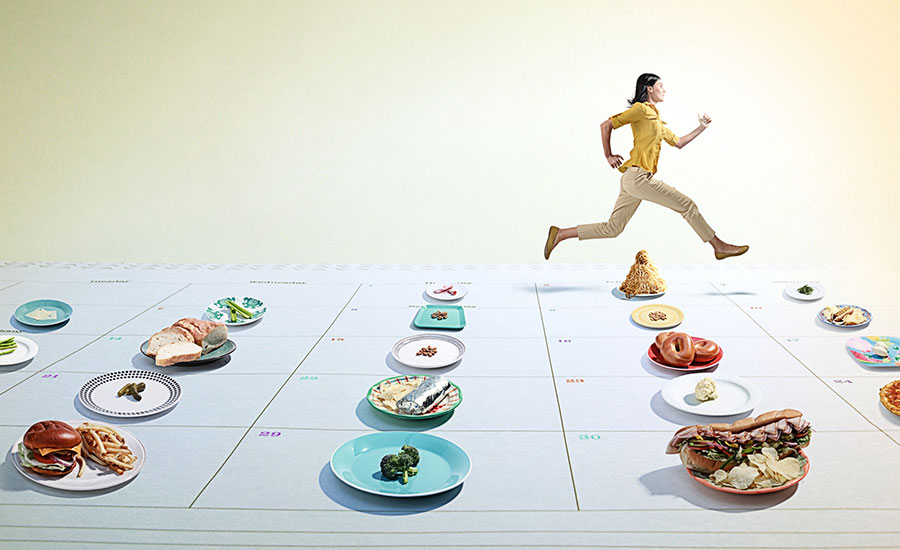Nine tips for creating a healthy, balanced vegan meal plan
1. Eat according to the seasons and your body constitution.
Buy vegetables that are in season and grown locally. It’s best to avoid fruit in the winter months as fruits are very cooling for the body.
As winter is dominated by cold, it’s better to eat warming foods instead to create heat in the body.
2. Include some protein at every meal such as beans, lentils, peas, nuts and seeds.
Protein anchors your blood sugar levels, repairs and builds tissues, and reduces hunger hormones.
Protein facilitates metabolic functions to occur in the body and helps regulate fluid balance.
3. Your plate should include a rainbow of vegetables and fruit every day.
Eat an array of different colored fruits and vegetables as they contain an abundance of minerals, vitamins, and antioxidants – key nutrients that enable cells to function efficiently, promote healthy metabolism, and protect cells from damage.
If your body gets all the nutrients it needs you will feel more energized and focused.
4. Healthy fats are important
They provide a source of energy for the body, aid the absorption of fat-soluble vitamins (vitamins A, D, E and K), manufacture hormones, and protect your cell membranes.
Good sources of fats include avocado, extra-virgin olive oil, nuts, flaxseeds, and flaxseed oil.
Vegans can get omega-3 fatty acids from hemp, chia seeds, purslane, algae, walnuts, and some green leafy vegetables.
Omega-3 is essential for brain health, mood regulation, cardiovascular function, and lowering inflammation in the body.
5. Ensure you consume sufficient B12 and iron.
These are essential nutrients needed for metabolism and energy production in the body.
There are some sources for vitamin B12, including nutritional yeast, yeast spreads (such as Marmite), chlorella, and nori seaweed.
Vegan sources of iron include dark green leafy vegetables, broccoli, pine nuts, sunflower and pumpkin seeds, apricots, black strap molasses, kidney beans and pinto beans, lentils, chickpeas, spirulina, and wheat germ.
6. Don’t forget calcium
Calcium is another important mineral that vegans can obtain from plant sources without needing to consume dairy. Calcium-rich foods include green leafy vegetables, broccoli, sesame seeds, tahini, sweet potatoes, almonds, hazelnuts, and legumes.
7.Include plenty of fiber
Consume a good amount of soluble fiber (beans, sprouts, sweet potatoes, broccoli, pears) as fiber helps to maintain healthy blood sugar levels and gut health.
Fiber keeps your bowel regular and your gut microbiome (beneficial bacteria in the gut) healthy.
8. Read food labels
Check labels to identify whether food is vegan or not, and also to avoid nasty ingredients and hidden sugars.
Many products claim to be “sugar-free”, “natural” and “a healthy alternative”; however, this is often far from the truth. Food manufacturers use these terms to attract attention to sell their products.
Natural flavorings and colorings usually mean they have been made chemically in a laboratory using toxic ingredients.
9. Avoid frying and cooking foods with damaged, hydrogenated oils such as rapeseed or vegetable oil.
Be aware that dairy-free spreads are also a source of damaged oils. Nut or seed butters are a more nutritious, healthier option.
Don’t heat foods to a high temperature, whether that be boiling or frying, as it can destroy the nutrients in the food.
Try to eat foods in their raw form or lightly sauté or steam where necessary.
New to veganism? Discover the benefits of a whole food plant-based diet.
CNM NATURAL CHEF CNM Natural Chef teaches the importance of a naturopathic diet that encourages the use of whole, organic and seasonal plant-based foods prepared and eaten in a way to ensure maximum nutrient absorption and healthy, sustainable weight loss. CNM’s Natural Chef training has been developed to meet the growing demands of a society increasingly interested in food that supports and promotes health. The course covers everything you need to know to become a successful CNM Natural Chef, from how the digestive system works, to building a culinary career! www.naturalchef.com or call 01342 360 985.


